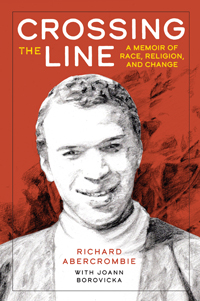At 14, Richard (Ricky) Abercrombie was besieged by prejudice because of his multi-racial background and angered by unsatisfactory answers to his heartfelt questions about religious truth. The time was 1960, and the place was Greenville, South Carolina. Ricky began carrying a gun, skipping school, and numbing his painful emotions with alcohol. His parents were worried and his future looked bleak. What happened next – an invitation to a birthday party at the home of a Bahá’í family – changed his life forever. Ricky became intrigued by Bahá’í teachings on racial equality, peaceful strategies for social justice, and the fundamental unity of religion. As he investigated these teachings, Ricky experienced a profound spiritual awakening that led him to give up the gun, stop drinking, and engage in life with hope and joy. His friends and family initially opposed his dangerous new association with racially integrated groups, but Ricky’s steadfastness drew them into investigating his new beliefs themselves. This true story of how a rebellious teenager transformed his own character and affected the lives of dozens of friends and family members is a cover-to-cover delight.
“Crossing the Line is not only a powerful recounting of a young man's journey in a racialized society, it embodies the realization and embrace of the spiritual and scientific truth that we are one human family. James Richard (Ricky) Abercrombie's story is uplifting testimony to the power of faith to spiritually transform a gnat into an eagle. This is a must-read across generations.” —William H. “Smitty” Smith, Ed.D., Founding Executive Director of the National Center for Race Amity
“Crossing the Line is a delightful memoir and an invaluable record of one of the early Bahá’í communities in the Deep South and of a woefully underappreciated stream of interracial activism during the 1960s. Richard Abercrombie is an engaging storyteller who provides vivid details about the events and experiences he recounts with humbleness and humor.” —Louis Venters, Ph.D., author of No Jim Crow Church: The Origins of South Carolina’s Bahá’í Community and A History of the Bahá’í Faith in South Carolina
“From the first sentence to the last word, Crossing the Line leads readers into a world swirling with questions about the meaning of life and the possibility of hope during times of difficulty—questions that are as relevant today as they were a half-century ago.” Frances Worthington, author of Abraham—One God, Three Wives, Five Religions and Bahá’í Basics






Crossing the Line
What an excellent read! This story recounts the challenges of racism, and how the Baha'i Faith influenced a transformation of not only one individual, but entire generations toward unity. An easy, enjoyable read!
Compelling education for all racial justice work
Richard Abercrombie, with Joann Borovicka, has written a powerful reconstruct of the 1960’s in the Deep South as a newly-awakened Baha’i. This educational storytelling of the lives of Mr. Abercrombie, his family and friends, in the deeply segregated community of Greenville, South Carolina, is expertly interwoven with Baha’u’llah’s teachings and the practical application Bahá’í youth wrestled with during the 1960’s civil rights movement. The reader walks with these souls, on an eye-opening accompaniment of sorts; I have learned so much! This amazing book was published in November 2019, barely six months before the current tide-turning racial injustice events. It’s unlikely the authors could have foreseen the timeliness and inestimable value of Mr. Abercrombie’s memoirs to the American Baha’i community, and America itself. The love, wisdom and practical application within these pages is a priceless learning for all - now, today, as in the 1960’s. We learn from those who walk before us.
Crossing the Line
Richard Abercrombie tells the story of his life as a Bahá'í, and, in the process, he gives a treatise on the relevance of Bahá'u'lláh's teachings in today's world. Abercrombie addresses questions about divine revelation and Faith and he also explores the tangible ways in which the laws and principles set down by Bahá'u'lláh can affect social change. Readers who are members of the Bahá'í community will find inspiration in learning about how African American Bahá'ís strengthened--and continue to strengthen--the foundations of unity in the Bahá'í Faith in America. Readers who are friends of the Bahá'í community will be inspired—and perhaps even convinced—of the social change that takes place when a person joins this global spiritual campaign of uniting all the peoples of the world into one human family. If you are looking for a book that explains how the Bahá'í Faith affects an individual and society and leads one to meaningful social action, this is the book—and it is for all ages.